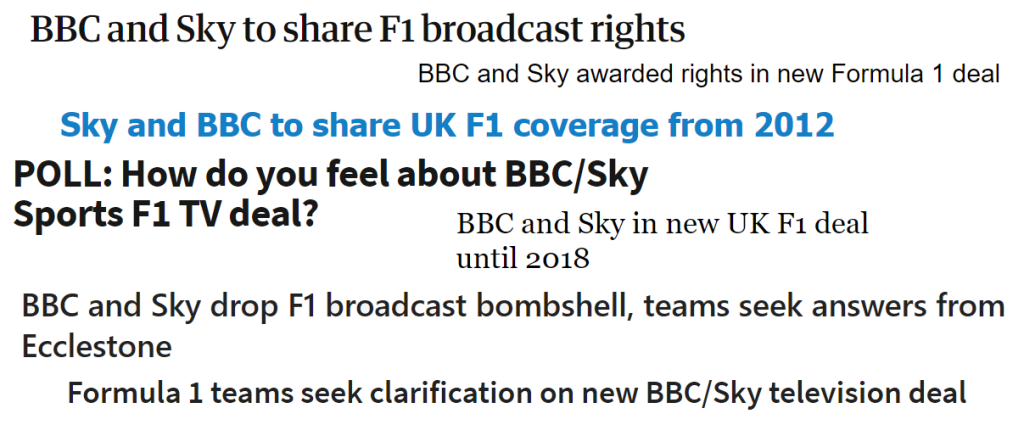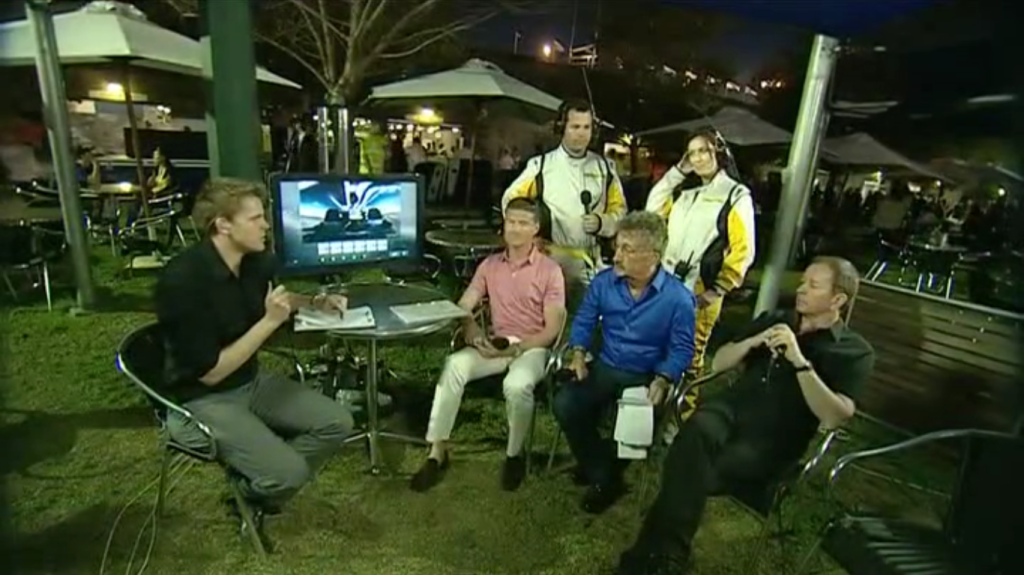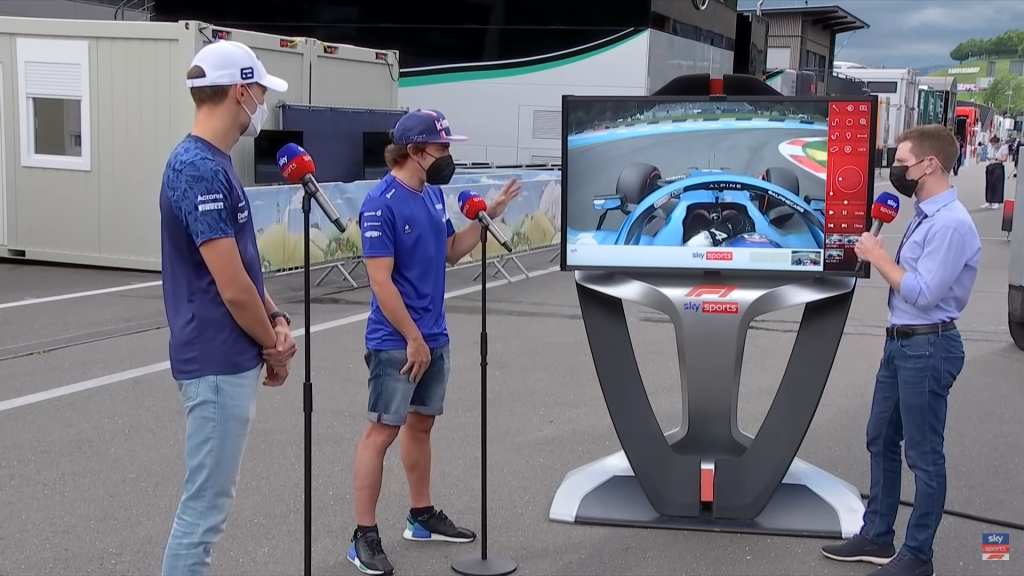Sebastian Vettel dominated the 2011 Formula One season, clinching his second Drivers’ Championship with four races to spare in Japan.
Although dominant up front, the 2011 season was competitive behind Vettel. One of the major talking points on-track was the frequent clashes between Lewis Hamilton and Felipe Massa, in what would turn out to be Hamilton’s penultimate season with McLaren.
Off-track, as the teams headed into the Hungarian Grand Prix weekend before the summer break, storm clouds began to emerge.
Hamilton may have topped a mundane first practice session in Hungary, but closer to home, a bombshell press release that landed just hours earlier sent shockwaves through the paddock and F1’s UK fanbase…
Here, Motorsport Broadcasting looks at the events that have unfolded since, and whether F1 is in a better place in the UK than what it was a decade ago.
The split
Ten years ago today, the BBC and Sky Sports confirmed that, from 2012, Formula 1 would air across both free-to-air and pay television as part of a new agreement between two of the biggest broadcasters in the UK.
2011 was the last season covered exclusively live, free-to-air by the BBC, the season becoming the highest watched in the UK on television.
BBC TV and Sky Sports have been awarded the live rights to Formula 1 ™ between 2012 and 2018.
The move will bring increased choice, innovation, and breadth of coverage to UK and Irish motor racing fans.
Press Release: BBC and Sky partner for live Formula 1 rights – Friday 29th July 2011
Since 2012, Sky Sports has aired every race live. The BBC’s programming supplemented Sky’s comprehensive offer, the free-to-air broadcaster airing half the races live and the other half in highlights form.
The previous Autumn, in October 2010, the government confirmed a licence fee freeze for six years which, in real terms, was a 16% cut to the BBC’s budget.
Cutbacks were necessary in some areas, and F1 was in the firing line.
The BBC’s original contract was set to expire at the end of 2013 and, writing at the time on the BBC website, their Head of F1 Ben Gallop said that the deal with Sky “extends the BBC’s commitment to F1 by a further five years.”
“Given the financial circumstances in which we find ourselves, we believe this new deal offers the best outcome for licence-fee payers,” Gallop said.

At the time, the deal generated a lot of response from fans. The likes of Autosport described the deal as ‘controversial’ on their magazine cover, and it is easy to see why considering the magnitude of the change.
With the benefit of hindsight, it is possible to look at the 2011 deal through a different lens.
What has happened since?
The BBC’s commitment to F1, which was meant to last until the end of the 2018 season, was short lived.
Another round of cuts was to come, and this time, BBC’s television coverage of Formula 1 was to disappear altogether.
Channel 4 succeeded the BBC as Sky’s free-to-air partner, retaining largely the same team both in front and behind the camera, as their coverage began in 2016.
We are absolutely delighted that F1 will remain on the BBC. The sport has never been more popular with TV audiences at a 10-year high and the BBC has always stated its commitment to the big national sporting moments. With this new deal not only have we delivered significant savings but we have also ensured that through our live and extended highlights coverage all the action continues to be available to licence fee payers.
Barbara Slater, BBC’s Director of Sport, speaking in 2011
If the 2011 bombshell was not big enough, a further bombshell was to follow.
Just one race into Channel 4’s new Formula 1 deal, Sky announced that they had secured the rights to air F1 exclusively live from 2019 to 2024 in a six-year deal.
Channel 4 would later secure free-to-air highlights, plus live coverage of the British Grand Prix from Sky.
By securing the pay-TV rights early, Sky fended off potential competition from rivals BT Sport, who were rumoured to be interested in F1 at the time.
The current Sky deal, mooted to be around £1 billion across the duration of the contract, or around £160 million per season, is significantly higher than what any free-to-air broadcaster could bid for the rights.
Let us rewind back to the 2011 deal and think about alternative scenarios. Had the BBC pulled out altogether, F1 may have moved on a full-time basis to Channel 4 or ITV.
With Sky lurking in the background though, it is difficult to imagine how many years such a deal would have lasted without Sky intervention.
The only alternative that could have had a material impact, even today, would be a joint BBC and ITV deal, like the current Six Nations rugby arrangements. On a 22-race basis, the BBC could air 7 races live, with ITV airing the remaining 15 races.
The two free-to-air broadcasters pay around £100 million per year for the Six Nations. The rugby tournament is a more attractive proposition to broadcasters than F1, with higher viewing figures and a higher proportion of action in primetime.
Any combined bid therefore would likely be under £100 million, even if you swap the BBC with Channel 4.
While it is a nice idea, the finances do not stack up when compared with the amount of money Sky have invested in F1.

Did Sky walk through an open door when the BBC approached them in 2011? Absolutely. But the destination, and where we are currently in 2021, was always going to be the same irrespective of the journey taken.
The BBC’s deal with Sky in 2011 delayed the inevitable. It was not a question of if, it was a question of when.
The transfer of rights from free-to-air to pay in the UK has been gradual, in stark contrast to Germany where audiences have slumped by around 70% because of the ‘big bang’ rights change imposed on audiences.
The pros and cons of the UK F1 broadcasting arrangement
On and off-air, the UK F1 broadcasting arrangements over the past decade have helped talent step into the motor sport arena, who may never have had a chance had F1 remained solely on BBC television.
The likes of Rachel Brookes, Jack Nicholls, and Steve Jones to name a few have benefited over the past decade.
Brookes joined Sky’s F1 setup when their coverage started, while both Nicholls and Jones joined the F1 paddock on a permanent basis later.
Nicholls became BBC’s lead radio commentator in 2016, a role once held by David Croft; while Jones became Channel 4’s F1 presenter having never presented an F1 race!
This is fantastic news for F1 fans and Sky Sports will be the only place to follow every race live and in HD. We will give F1 the full Sky Sports treatment with a commitment to each race never seen before on UK television. As well as unrivalled build up to each race on Sky Sports News, we will broadcast in-depth live coverage of every session. Sky customers with Sky Sports will also be able to enjoy F1 across multiple platforms and devices, including Sky Go.
Barney Francis, Managing Director of Sky Sports, speaking in 2011
Having several broadcasters in the mix presenting their own bespoke output not only gives emerging talent more opportunities to break into the sport, but it gives viewers access to a broader roster of pundits.
From the BBC’s Jolyon Palmer, through to Channel 4’s Mark Webber and onto Sky’s Anthony Davidson, there should be something for everyone across the talent pool, across live and highlights.
The broadcasting arrangements since 2012 have resulted in every F1 session airing live, as well as the vast majority of Formula Two and Formula Three sessions.
Having multiple broadcasters air live F1 from 2012 to 2018 meant that the two could push each other to produce better content, with the fans watching at home benefiting overall.
I think it is important to emphasis at this point that Sky have an excellent team: Davidson, Jenson Button, Martin Brundle and Karun Chandhok to name a few, a rotating talent set helping to keep their coverage fresh race-by-race.
While Sky do produce excellent features (and I suspect the upcoming feature with Mick Schumacher in the Jordan 191 will fit into this category), including high-quality Sky Pad analysis, these sometimes feel isolated in amongst their lengthy pre-shows.

COVID has restricted what Sky can do, as Brookes outlined to this writer earlier this year. That combined with the number of races on the calendar now, dilutes the quality of programming on offer to the viewer.
Broadcasters want more races, as races attract viewers, but it means that their supplementary programming takes a hit.
Formula Two and Formula Three feel like an afterthought (not helped by the changes beyond Sky’s control), while Sky have failed to replicate the attraction of BBC’s post-race show, F1 Forum, in my view, where the team used to perch themselves in a motor home.
Despite the criticism, since Sky moved to the podium set up in the paddock, their post-race shows have improved, and is heading in the right direction.
Worryingly for Channel 4, their free-to-air highlights audience has slumped over the past two years, to the point where Sky is moving into a position whereby it has the lion’s share of the F1 audience, an unthinkable statement even two years ago.
The good news in totality for F1 is that Sky’s audiences are increasing rapidly, and are at their highest level yet (more to follow on this front over the forthcoming weeks).
Yes, television audiences have decreased compared with a decade ago, but fans have a much wider range of viewing options now.
Back in 2011, F1 did not upload highlights to YouTube, podcasts did not exist, and the F1 social media community was insignificant. Oh, and that thing called Drive to Survive was still eight years away.
Sky may have Bernie to thank for the initial deal signed in 2016, but they absolutely have Liberty Media to thank for maximising F1’s potential across the digital platforms.
If F1 is going to continue to sign exclusive pay TV deals, then they need an action plan on how they aim to reach fans that do not have pay TV. Otherwise, F1 will haemorrhage fans.
A Formula 1 only accessible behind a pay wall is not a fruitful Formula 1.
A Formula 1 that exploits social media, is available to fans at a reasonable price, and finds new, innovative ways to harness their audience, is a fruitful Formula 1.
Motorsport Broadcasting, writing in 2016 [pleasingly I think F1 currently aligns more into the second category. Not fully, but the second category resonates more with me].
A survey by The Race Media, which operates both The Race and WTF1, shows that most fans on both platforms watch F1 via pay-TV, with less than a quarter watching via free-to-air television.
It is plausible that F1 in the UK has lost older viewers over the past decade (‘lapsed fans’), thanks to the move away from the BBC, but gained some younger fans through the likes of Drive to Survive, thanks to Netflix and Liberty Media. It may still result in a net loss, but the picture is not as black and white as the headline suggests.
A major gripe for UK fans is that fans do not have access to F1’s premium tier over-the-top service, meaning that the only way fans can watch live F1 is through Sky Sports.
How open Sky are to this position changing is unclear. Suggestions last summer that Sky would offer F1 TV Pro through their TV platform have yet to come to fruition.
Nevertheless, for everything that has changed over the past decade, F1 remains king and is by far the leading series when it comes to motor sport in the UK, with no other form of motor sport eroding its dominant market position.
What is next?
While Hamilton may retire in 2024, the prospects of both Lando Norris and George Russell look bright, which should keep interest in the sport high, which is great news for Sky Sports moving forward.
We can reminisce about every F1 race airing live on free-to-air television all we want, but the chances of F1 returning to that position in the UK after 2024, when Sky’s current deal expires, is close to zero.
In a sense this partnership with Sky is another example of how the landscape of sports broadcasting has been transformed in recent years. There was a time when the BBC and other public service broadcasters could expect to televise all the big sports themselves. Now though we have a ‘mixed economy’, with some events on satellite while others are on terrestrial.
Ben Gallop, BBC’s Head of Formula 1, speaking in 2011
In my view, I expect Sky to renew beyond 2024, with confirmation to come within the next 12 to 18 months.
Such a renewal may seem far too early, but remember that Sky sealed the 2019 deal three years in advance. F1 is Sky’s second biggest sport, only behind football, and the earlier they can renew on a like-to-like basis, the better for them.
Furthermore, the economic climate post-COVID means that F1 is unlikely to see an increase in rights fees from the UK market. As thus, extending the current agreement with Sky may be in F1’s best interests too. Stability is in the interests of both parties.
When I outlined the above to someone close to the situation recently, what was their response? “I think you’re on the money, Dave…”
How have your viewing habits of Formula 1 changed in the past decade? Have your say in the comments below.
Contribute to the running costs of Motorsport Broadcasting by donating via PayPal. If you wish to reproduce the contents of this article in any form, please contact Motorsport Broadcasting in the first instance.
